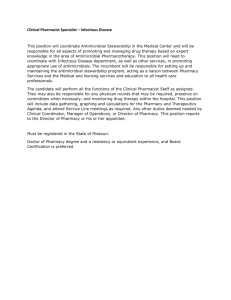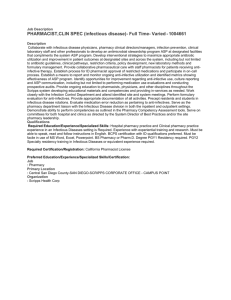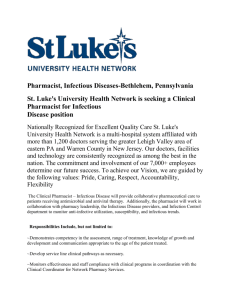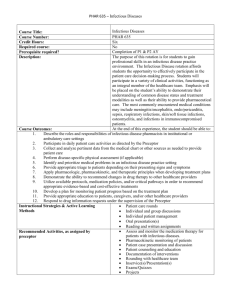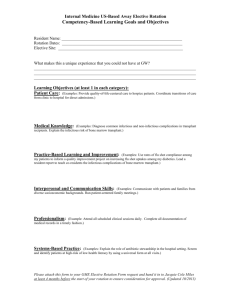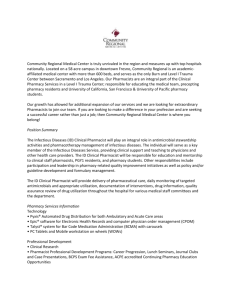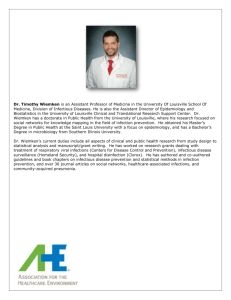Infectious Diseases Rotation for Doctor of Pharmacy Students
advertisement
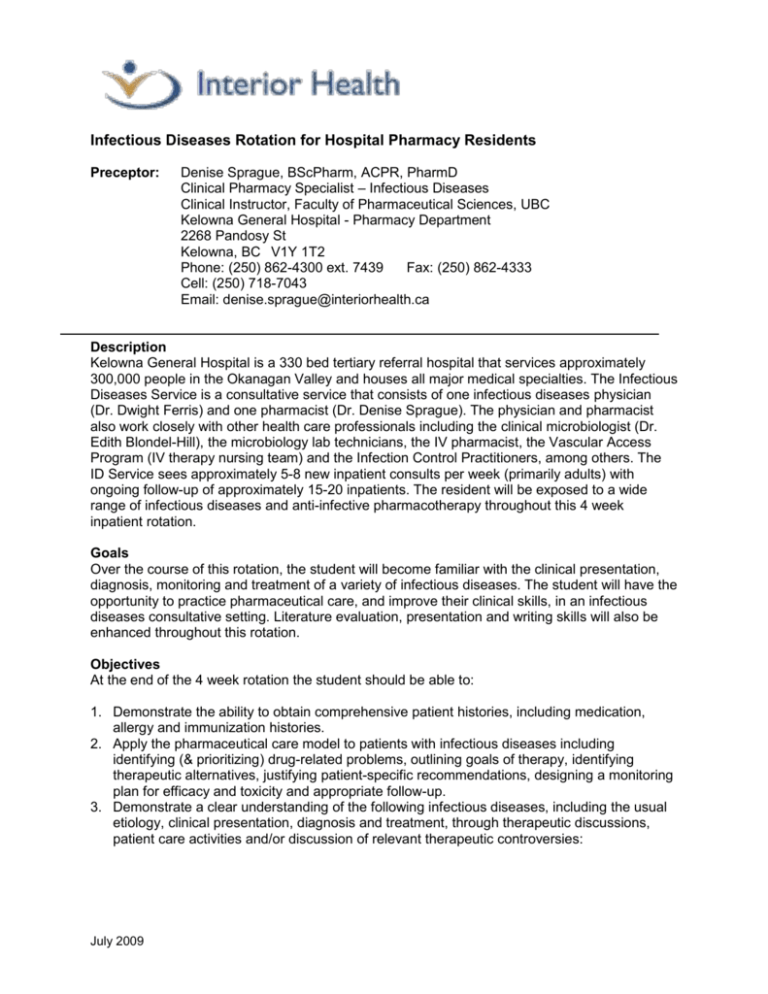
Infectious Diseases Rotation for Hospital Pharmacy Residents Preceptor: Denise Sprague, BScPharm, ACPR, PharmD Clinical Pharmacy Specialist – Infectious Diseases Clinical Instructor, Faculty of Pharmaceutical Sciences, UBC Kelowna General Hospital - Pharmacy Department 2268 Pandosy St Kelowna, BC V1Y 1T2 Phone: (250) 862-4300 ext. 7439 Fax: (250) 862-4333 Cell: (250) 718-7043 Email: denise.sprague@interiorhealth.ca Description Kelowna General Hospital is a 330 bed tertiary referral hospital that services approximately 300,000 people in the Okanagan Valley and houses all major medical specialties. The Infectious Diseases Service is a consultative service that consists of one infectious diseases physician (Dr. Dwight Ferris) and one pharmacist (Dr. Denise Sprague). The physician and pharmacist also work closely with other health care professionals including the clinical microbiologist (Dr. Edith Blondel-Hill), the microbiology lab technicians, the IV pharmacist, the Vascular Access Program (IV therapy nursing team) and the Infection Control Practitioners, among others. The ID Service sees approximately 5-8 new inpatient consults per week (primarily adults) with ongoing follow-up of approximately 15-20 inpatients. The resident will be exposed to a wide range of infectious diseases and anti-infective pharmacotherapy throughout this 4 week inpatient rotation. Goals Over the course of this rotation, the student will become familiar with the clinical presentation, diagnosis, monitoring and treatment of a variety of infectious diseases. The student will have the opportunity to practice pharmaceutical care, and improve their clinical skills, in an infectious diseases consultative setting. Literature evaluation, presentation and writing skills will also be enhanced throughout this rotation. Objectives At the end of the 4 week rotation the student should be able to: 1. Demonstrate the ability to obtain comprehensive patient histories, including medication, allergy and immunization histories. 2. Apply the pharmaceutical care model to patients with infectious diseases including identifying (& prioritizing) drug-related problems, outlining goals of therapy, identifying therapeutic alternatives, justifying patient-specific recommendations, designing a monitoring plan for efficacy and toxicity and appropriate follow-up. 3. Demonstrate a clear understanding of the following infectious diseases, including the usual etiology, clinical presentation, diagnosis and treatment, through therapeutic discussions, patient care activities and/or discussion of relevant therapeutic controversies: July 2009 Mandatory topics: CNS infections, endocarditis, pneumonia, C. difficile associated disease, skin & soft tissue infections, bone & joint infections, UTI/urosepsis, bacteremia/sepsis. Adult immunization will also be a mandatory discussion. Optional topics (depending on student’s interest and patient care activities): Cystic fibrosis, tuberculosis, influenza, hepatitis C, intrabdominal infections, antiretroviral therapy, opportunistic infections in HIV, surgical prophylaxis, febrile neutropenia 4. Demonstrate a clear understanding of the indication, spectrum, mechanism of action, dosage forms, dose, route, drug interactions and monitoring parameters for the following anti-infectives: cephalosporins, penicillins, carbapenems, macrolides, tetracyclines, trimethoprim-sulfamethoxazole, rifampin, fluoroquinolones, vancomycin, aminoglycosides, linezolid, daptomycin, clindamycin, metronidazole, antivirals, azole antifungals, amphotericin and echinocandins. 5. Demonstrate the ability to clearly and concisely document in the patient’s health record. 6. Demonstrate timely and effective written and/or verbal responses to drug information requests from patients and/or health care professionals. 7. Demonstrate the ability to communicate effectively with other health care professionals and patients regarding patient care issues. 8. Demonstrate the ability to critically evaluate the infectious diseases literature and effectively present either a patient case or journal club to the pharmacy staff. Required Activities 1. Provide pharmaceutical care to inpatients on the ID Service Monday to Friday. The student’s workload will be determined based on previous experience and comfort in the ID setting. 2. The student will liaise as necessary with other member of the healthcare team to facilitate seamless care when the patient is no longer followed by the ID service or is discharged home. 3. The student will meet briefly with the preceptor in the morning to discuss workload/patient coverage. 4. The student will meet with the preceptor for 1-2 hours daily in the afternoon to discuss patients and therapeutic topics. 5. Be prepared for 2-3 therapeutic discussions per week with the preceptor. 6. The student will discuss all chart notes and recommendations for patient care with the preceptor prior to implementation. 7. Present one patient case or journal club article to the pharmacy staff at pharmacy education rounds. 8. Attend weekly pharmacy education rounds (Thursday 1200-1300). 9. Attend weekly Grand Rounds (Wednesday 0800-0900) if an infectious disease topic is being reviewed. Grand Rounds are otherwise an optional activity. Equipment 1. Scientific calculator (required) 2. Name tag (required) 3. Pocket Infectious Diseases reference of student’s choice (optional, but recommended) 4. Lab coat (optional) July 2009 Preceptor Role & Responsibilities 1. Outline the rotation goals and objectives with the student at the beginning of the rotation and design a schedule for rotation specific activities and topic discussions with the student. 2. Introduce the student to pharmacy and infectious diseases team members. 3. Orient the student to KGH, the ID Service and the pharmacy department. Ensure the student has appropriate computer and department access. 4. Be available on a daily basis for patient and therapeutic discussions. 5. Assist the student in selecting topics for required assignments and be available to discuss assignments as needed. Staff Interior Health Pharmacy Director – Kevin Peters KGH Pharmacy Practice Leader – Dawn Robb KGH IV/Distribution Pharmacy Supervisor – Gord McGreevy Infectious Diseases Consultant – Dr. Dwight Ferris Infectious Diseases Administration Assistant – Dianne Laurie Medical Microbiologist – Dr. Edith Blondel-Hill KGH Microbiology Supervisor – Derrick Johnston Infection Control Practitioners – Missy Blackburn, Wendy Lutz, Meg Miller Vascular Access Program nurses – Tami Jemson (Patient Care Coordinator), Jennifer Spink, Linda Dunlop, Claire Mountford July 2009
